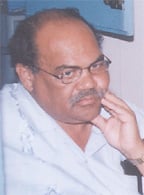Industry open to alternative methods that make business sense
Executive Secretary of the Guyana Gold and Diamond Miners Association, Edward Shields has told Stabroek Business that the mining sector is not necessarily wedded to the use of mercury in the gold reclamation process.

Responding to frequently expressed concerns about the harmful environmental effects of mercury Shields said that he is satisfied that miners are responsive to the domestic and international lobby for environmentally safer methods of mining. “We have no particular attachment to mercury. Miners are no different to other people. We will go other ways as long as those ways make business sense,” Shields said.
Noting that mining was, first and foremost, an economic activity, Shields told Stabroek Business that it was erroneous to suggest that the use of mercury was “an issue” for miners. He said that the mining community would not be averse to mercury-free mining methods that made business sense.
‘Like any other business, those operators who find the sector unprofitable will go out of the business,’ Shields said.
According to Shields the conventional approach to the promulgation of environmentally safer methods of mining that targeted the use of mercury, had been attended by “negative comments” about the mining sector that may have served to create the impression in the sector, particularly among the larger operators, that the future of mining may have been under threat. He added that public pronouncements by the World Wildlife Fund (WWF) and other agencies concerned with the preservation of the environment that mining as an economic activity “was here to stay” had served to reassure the sector and to make miners more amenable to embracing environmentally safer mining methods. “The sector is now much more comfortable and its relationship with the environmental agencies is now a much better one,” Shields said.
Two weeks ago Acting Commissioner of the Guyana Geology and Mines Commission (GGMC) William Woolford told Stabroek Business that he was satisfied that the mining sector had been responsive to the efforts being made by the Commission to raise standards of environmental responsibility in the industry. The GGDMA has recruited two environmental officers whom, Shields said, were, even now, working alongside GGMC officials in a number of areas including non-mercury methods of mining and land reclamation. He said that the GGDMA had also received assistance from the WWF to acquire equipment used to test for pollution on mining areas which equipment had already been put into use.
Shields said that as part of its ongoing effort to sensitize miners to environmentally sustainable mining practices, the GGDMA had prepared and published a manual on alternative, non-mercury methods of mining outlining practices in the sector in French Guiana. Apart from providing information on mercury-free mining the manual also provides guidelines on processing and land reclamation.
Meanwhile, according to Shields the GGDMA is currently supporting the GGMC in an effort to regularize the status of a number of Brazilian operators currently working in the mining sector. He said that while he was unsure of the exact number of Brazilian operators working in the mining sector he believed that no more than 10 per cent of those operators – mostly larger operators – had work permits. Shields told Stabroek Business that the arrangements under which the Brazilians operated in the sector were “complex.” He explained that many of them had engaged a few bilingual locals to secure permits for them to work in the sector. Shields said that this process “sometimes turns out to a lengthy one” leaving some of the operators legally vulnerable. The GGDMA official told Stabroek Business that in those circumstances state security patrols in mining communities seeking to establish the bona fides of these operators were within their right to do so. Shields added that Brazilian operators seeking permits to work in the mining sector in Guyana are best advised to interface with the GGMC.
